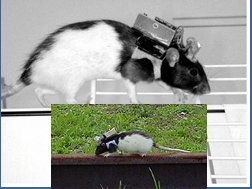The Ethics of Enhancing Animals, Specifically the Great Apes
Guido David Núñez-Mujica
page 3 of 5
The debate about the rights of chimpanzees used in biomedical experiments continues. On one side, the Great Ape Project urges  the granting of human rights to apes. This organization asks that experiments on chimpanzees not be done if it causes them any harm whatsoever. On the other hand, the United States holds the position that great apes have no human rights, but they do hold a special status compared to other animals. Scientists can experiment with them in painful ways if they are seeking knowledge that will benefit mankind. Neither position allows for anyone to harm chimpanzees for “no good reason”.
the granting of human rights to apes. This organization asks that experiments on chimpanzees not be done if it causes them any harm whatsoever. On the other hand, the United States holds the position that great apes have no human rights, but they do hold a special status compared to other animals. Scientists can experiment with them in painful ways if they are seeking knowledge that will benefit mankind. Neither position allows for anyone to harm chimpanzees for “no good reason”.
What is Enhancing?
Image 3 shows a rat that has been “enhanced”.

Image 3
The device on its neck allows the experimentor to lead the rat to the left or to the right. According to Wikepedia, “uplifting” (which is synonymous with enhancing) means “the theoretical prospect of endowing non-human animals with greater capacities, including and especially increased intelligence. It is highly likely that biological uplifting would be accomplished through the application of genetic and transgenic technologies, and possibly even artificial intelligence.”
Enhancing, an Age-Old Idea
Enhancing is not a new idea. It has existed all along in our history as human beings. As mentioned previously, in mythology, gods were presented as enhancers of primitive humans. In the myth of Prometheus, he stole fire from the gods and gave it to us and that allowed us to have a civilization. He was punished for that, but the result of his actions was to enhance humans’ capabilities.
In a more practical way, we have been enhancing animals since civilization began by breeding and training animals so that they better serve us. In modern science fiction, the subject has been covered from several points of view by several authors from the classic "Sirius" by Olaf Stapledon, to the "Uplift" saga by David Brin, in which enhancing is a galaxy-wide activity with complex rules. Another popular story about enhancing is the frightening work of H.G. Wells, "The Island of Dr. Moreau".
Why Enhance the Great Apes?
When speaking of enhancing, I chose to speak about the great apes because they are the living beings that most closely resemble humans. Humans share more than 96% of our genes with apes; 98.5% with chimpanzees. They possess characteristics that had previously only been attributed to humans. Chimpanzees speak and understand sign language, they also use tools and transmit its use to their offspring. They show some sense of self-awareness. They show empathy. They have culture.
Amazingly, chimpanzees are able to lie to their experimenters. They communicate between each other in sign language when the experimenter is not present. From this, we know that they are not just communicating to get a reward from the experimenter.
Because they are so genetically similar to us, enhanching the great apes will be easier than enhancing other species. This does not mean that we could not theoretically enhance another species such as dolphins, monkeys or parrots, which all possess high cognitive activity. Still, apes hold the most promise.
1 2 3 4 5 next page>